- Home
- Trevor Hoyle
Blind Needle Page 15
Blind Needle Read online
Page 15
This wasn’t a game after all. She was actually feeling something, and suffering for it. I felt shocked.
I said, or rather stammered, ‘Diane …’ and she turned her back on me, moving to the cupboard.
‘I have to prepare a meal for Graham, he’ll be home soon.’
‘Diane—’
‘What?’ she said irritably, her voice under control again, taking things from the cupboard.
‘It isn’t worth it,’ I said feebly, not knowing what else to say.
‘I know that. It’s never worth it.’ She kept her back to me. ‘None of us are worth it. But I’m not going to stand around and let you destroy yourself because of some tin-pot councillor and crooked businessman who runs a clapped-out haulage firm. I know how you feel about your wife and what happened to her, and how you must hate him for it, and want him dead. But I won’t let you do it, Peter. I’ll stop you.’
‘How will you stop me?’
‘Any way I can.’
‘I believe you would.’
‘I mean it.’
‘What about Benson?’
‘To hell with Benson.’ She was opening a tin. ‘Send all that stuff to the police and wash your hands of the whole affair. Have done with it. It’s that simple.’
Diane Locke was right. I could be rid of the whole thing, just forget about it. Why let Benson ruin my life a second time? I could start again, this time with a woman who seemed to care about me (I was still in shock that she had cried) and obliterate the past. Let Benson get on with his crooked marina scheme, what did it matter to me? Let him dump bodies in the harbour, so what?
So what if Benson actually had done the deed, or arranged for it to be done (tattoo marks meant Wayne); then it occurred to me that he could be made to pay a far higher price than a gentle chiding from someone in Whitehall. The question was, how to prove it? Where to find the evidence? There was one way, it now struck me …
Tracing the body back from the harbour led to the discharge pipe, and from the discharge pipe to the public swimming baths, and from the swimming baths to whoever had been an accomplice to the crime. Of course Benson himself wouldn’t have sullied his hands, I was certain of that. Not when he had Wayne to do it for him. And Wayne must have had help. Somebody who had access to the public swimming baths, who knew how the equipment worked – who knew, in fact, how to do a neat job of disposal without fouling up the system while squirting the corpse into the Irish Sea.
Into the silence the brass-rimmed clock dropped five melodious chimes. Clasping the attaché case in both hands, I let my shoulders slump. ‘All right, I’ll stay.’
Diane Locke didn’t say anything, just carried on preparing the meal.
2
The green single-decker bus took me from Granthelme and dropped me in the centre of town just after midday. I looked for the line of demarcation as the bus twisted through the narrow country lanes but couldn’t locate the exact spot. Once in Brickton, however, there was no mistaking that we had crossed it.
I was wearing one of Graham’s old suits – grey with a faint chalk-stripe, double-breasted, with turn-ups on the trousers – that I’d rooted out of his wardrobe. I ought to have felt guilty about it, borrowing his clothing without permission, but I didn’t. But I did feel guilty about betraying Diane’s trust. We had come to a tacit understanding, Diane Locke and me, that my pursuit of Benson was over and done with – a foolish, aberrant urge for revenge that could only lead to my own destruction. There was no question that I had convinced her, because she had gone off in the Datsun on some errand or other, leaving me alone in the house. There I had waited fifteen minutes and then set off on foot down the muddy lane, having left a scribbled note that I hoped to return later for the attaché case; if I didn’t she was free to do with it as she pleased. If I didn’t return, I thought, it wouldn’t matter to me what she did with it.
I was glad to be still wearing my overcoat: it was damp and windy, cold air swooping down from the north with the stinging touch of real winter. Just the kind of day to shut out the world in the steamy warmth of a Turkish bath.
At the traffic lights (B-H Haulage was up the hill on the opposite side) I turned left to get quickly off the main street; it was the reflex action of somebody used to being hit who ducks and shies away from every imagined blow. Possibly it was rather pointless: I might have been recognised just as easily on the backstreets. But I felt safer and more at home here, among the crumbling brick buildings and the peeling facades of empty shops. There was a newsagent’s on the corner, with plastic toys made in Taiwan and dusty trays of penny sweets, the colour of neon signs, in the window. The man serving behind the counter had on a shapeless brown tweed jacket with black plastic patches on the elbows and thin strips crudely stitched round the cuffs. He was sucking on an empty pipe, which drooped down dead-centre onto his chin, gripped between dentures like yellow tombstones.
He attended to a woman customer while I pretended to glance over the layered piles of tabloids. The counter was a hotbed of Rape, Scandal, Child Abuse, Beast and Check Your Lucky Number! I slid one (Sex Romp) off the nearest pile. He held out a thin grubby hand for money, fingers blackened with newsprint.
I asked him where the public baths was. The pipe swivelled, resting on his chin, as he dropped the coins in the till.
‘Aboukir Street.’
‘Is that near here?’
‘Left in the street, straight down, then one … two …’ he weighed it up, sucking, his breath hollow in the empty bowl ‘… third on the right, next to the cleansing department.’
‘Suitable place for it,’ I remarked, smiling. He stared at me incomprehendingly as if I’d said something in Serbo-Croat.
Brickton Public Baths was a smaller, sootier version of the town hall, built in the same age and with the same prosperity. There was a small portico and an arched entrance flanked by pillars that would have admitted giants. The doors, a muddy council blue painted over gouged initials and obscenities, let the tone down. My footsteps echoed in the hallway, tiled from floor to ceiling in green and yellow and lit by frosted globes submerged in the walls. A girl sat in a glass-fronted cubicle, staring at nothing, her lips moving as she listened to a tape on a Japanese stereo deck that was all chrome fretwork and silver dials and flickering needles. The smell of chlorine and bleach stung like anaesthetic.
‘One Turkish, please, and a towel.’
‘Two pound fifty.’
I sorted through my coins. I was over a pound short. She watched me vacantly with eyes stickily rimmed in purple, lips moving to, ‘You’re my fantasy-dream, gotta have that drivin’ beat, poundin’ through my heart and spleen, turn your key in my lock, you sex-machine.’
‘Can you change this?’ She accepted the stiff £20 note and pushed the change and a perforated ticket through the shallow brass depression under the glass, polished by generations of copper pennies and threepenny bits. With her other hand she reached down and tossed a towel onto a ledge at the side of the cubicle, and slid back a glass partition. I went round and picked up the towel.
There were no signs. Frosted globes illuminated the length of the tiled tunnel leading nowhere.
It was the unlikeliest of places in which to find conspiracy, or even the lowest form of petty financial chicanery – a Victorian bathhouse! Sharp businessmen and asset-stripping entrepreneurs at the cutting edge of the System wouldn’t have detected the barest shift of a percentage point on their sonar; not even worth a grubby lawyer’s deal to buy it up, raze it to the ground and build a car park or a superstore. You didn’t plan on building anything in Brickton: it was a dumping ground, a spot of coastal blight on the edge of the known universe, a place better left to the slag merchants and scrap dealers. Benson was in on that, ferrying sludge in his tanker fleet. He had found a smart way to make it pay. He even operated night shifts, loading up and squirting the stuff out at night – where? In the harbour? I had assumed the conveyor chain of buckets was for dredging, but it could have had the oppo
site purpose.
A bald-headed man with a paunch, in a singlet and baggy blue track-suit bottoms, passed along the tunnel, rubber soles squeaking on the tiles. When I asked for the Turkish he nodded once, over his shoulder, and went on.
I came to a T-junction, empty corridors left and right marked off in light and shade by the globes. No signs or directions of any kind; but a door, directly in front of me, half open, gave a glimpse of a tiled room with rows of metal lockers with stencilled yellow numbers. I went in and walked the length of it, stepping gingerly so as not to slip on the wet floor. At the far end, round a corner, there was a shower-room with lead pipes and copper fittings, and beyond that lapping green water, steam curling and drifting from its surface. It was very quiet. Too quiet for a swimming baths, in which every sound is amplified. Even without children, who were in school, you would have expected to hear the splash of divers and an occasional shout echoing up to the vaulted roof. From where I stood, the segment of the pool in view was placid and undisturbed, its glittering reflections dimmed to a hazy dazzle by the drifting curtain of steam.
‘Oy!’
The bald-headed man in the singlet was standing inside the door with his hands on his hips, the shadowy dimple of his belly-button like an empty eye socket in the centre of his hanging paunch.
‘I tout you say Turkish.’
‘Yes. Is this—’
‘Dis not it.’ He jerked his thumb. ‘Here. Come on. Dis way.’ His accent was eastern-European, possibly Polish. Now that I looked at him properly I saw that his features were Slavic, the broad pale skull and large-lobed ears, a heavy brow overhanging pale slitted eyes. ‘Dis way,’ he repeated, wagging his thumb.
He pushed the door farther open with his foot, a bare hairless ankle, white as chalk, exposed between the blue track-suit bottoms and laceless black plimsolls. ‘If you want Turkish, go dis way.’ He pointed. ‘See?’
I thanked him and heard him squeaking off into some other part of the building. The corridor led to a flight of steps down into the basement. The air became suddenly humid, moist against my forehead, and I started to sweat under my suit and heavy overcoat.
The locker room at the bottom of the stairs was smaller and darker than the one above, its low ceiling lined with pipes from which the heat seemed to throb in waves. I took off my overcoat and hung it in a locker, then stripped down to my underpants. Of course I couldn’t wear them in the steam room, so I took them off and wrapped the towel round my waist. The key to the locker was embedded in a cylinder of pink plastic, attached to a large brass safety-pin. Steam hissed and water gurgled through the pipes overhead, and I followed the pipes to where they twisted downwards in the corner and writhed through the wall.
In the first and coolest of the steam rooms, two figures, one naked, the other wrapped in a towel, sat on a low bench like wilting pink Buddhas. I sat down on the bench at right-angles to theirs, slumping forward with my elbows on my knees. Perspiration started to pop out all over me and I felt my pulse-rate quicken; for a minute I had to concentrate on breathing, taking short shallow breaths for fear of scalding my lungs.
One of the men, with white hair, seemed familiar. I couldn’t see his face clearly, though there was something about him that sparked a memory.
‘It’s a worthy cause, we mustn’t forget that,’ he was saying in a bluff, assertive voice, in the strident timbre that carries across noisy, crowded rooms and turns a whisper into a declamation. ‘They do grand work. They sent me a list of their beneficiaries. It makes impressive reading.’
‘Are they registered?’
‘How do you mean?’
‘As a charity.’ The other sounded shrill by comparison, an elderly whine. ‘I think I’m right in saying that it’s a stipulation that they have to be registered. There’s some rule or other.’
‘What rule? What bloody rule is that?’
The words shot back from the tiled walls, seeking and finding no means of escape, and then I placed him. It was the white hair, I remembered now, spiky and luxuriant when I’d seen him last, with his chain of office, strutting from group to group of councillors at the town hall, a beefy hand hitting colleagues on the back and bouncing on his toes as he swapped jokes.
‘You mean if I decide I want to support the Disabled Trawlermen and Inshore Fishermen Benevolent Fund I’m not allowed? It’s my bloody choice, isn’t it? Why the hell not?’
‘No … well, yes it is, but not as the mayor’s officially sponsored charity appeal. It has to be registered, you see, Norman. That’s the rule.’
‘There would be a bloody rule, wouldn’t there?’ the mayor said darkly. ‘What the hell’s it matter if it’s a good cause? You know – and I know – blokes who’ve devoted their lives and health to fishing in this town. We owe them something. The industry’s gone but that doesn’t mean the men who served it should be forgotten.’ He raised his head and squinted at me through the eddying steam, perhaps only now aware they were not alone.
‘That’s the way it is, I’m afraid. It’s a stipulation of the mayoral office,’ the other said, and as he too glanced towards me I realised it was the chairman of the Recreation and Entertainments Sub-Committee, the man with the pipe and the gavel and the officious, if ineffectual, manner.
The close-set eyes in the narrow face sharpened. Was it a sudden flaring of recognition, or the inquisitive stare of the short-sighted? He seemed to be pondering, sucking in his cheeks and blinking rapidly – myopically, I hoped.
The mayor said, ‘It’s a bugger when you can’t pick and choose your own bloody cause. It’s in my name – it’ll go down as the Norman Wilson Charity Appeal for my year in office.’ His grumbling had reclaimed the other’s attention, who wagged his thin grey head.
‘Absolutely. Couldn’t agree more. But what’s to be done? It’s a standing rule, Norman, and there it is.’ He was the kind of man who thanked God for rules, because the alternative was chaotic free choice and painful original thought. He mumbled, ‘I fear you’ll have to consult the list. I’ll drop a memo’ (he pronounced it ‘meemo’) ‘to Broughton and have one sent up.’
I left them, the one grumbling, the other placating, and moved on.
The steam got hotter and more dense. Other vague white shapes lurked in the rooms beyond, standing, sitting on benches, some lying full length like corpses. There seemed no end to the rooms: in one a man was dousing himself under a cold shower, feet spread apart, head held back, a fine network of veins like blue lace on his abdomen and upper thighs. I plunged further on, encountering dryer heat that exhausted the oxygen content of the air so that each breath was a painful gasp, as if I were labouring with a seventy-pound pack halfway up a mountain. It was a bloody efficient system they had installed; the boiler necessary to produce so much steam must be of gargantuan size, I reckoned.
After a while I had to sit down and rest. It was the hottest room so far – too hot, perhaps, because I slumped down just before I collapsed, blinded by sweat, my heart knocking in my chest as if an anvil were being struck rapidly and repeatedly. If there was anyone there in the room with me I couldn’t see them in the suffocating fog.
It was two nightmares combined: the regression into nothingness, the white womb, cut off from the ordinariness of pavements, shops, buses, crowds of people, sky, trees, buildings; and the other common dreaming phobia of suddenly finding yourself naked and vulnerable in an exposed place, with only a flimsy garment for protection. The moist whiteness pressing itself against me and swirling in front of my eyes was the physical manifestation of my own fear – the appalling dead blankness at the epicentre of my mind.
It was just the place, the perfect place, I thought, that S – would choose to commit one of his sick atrocities. Could he have actually done the things he boasted about? It didn’t matter whether he had or not. What mattered was that I believed him. Maybe he hadn’t murdered his wife in the way he described, it was all bravado, pure delusion, but even so his vile fantasies struck me witless, left me weak and gasp
ing.
And of course, thinking this, I immediately started to panic, imagining him there, circling round me in the steam, eyes wide and bright, silent laughing mouth agape.
Murdering Bastard
You killed
My wife
Killed–
I staggered to my feet, slithered on the damp tiles, almost fell. My God, was I imagining his voice as well? The words whispered hoarsely through my brain, spoken in exactly the same gasping, guttural tone I remembered. Or were they not imagined, remembered, but actually spoken aloud, here and now? Was it possible that S – had followed me here, accepting with gratitude this golden opportunity? What better place than the shrouded white of a steam-room, misty shapes in a swirling, shifting limbo?
But I was wrong. I had to be wrong. For the simple reason that he didn’t know where to find me. He couldn’t have followed me to Brickton because I’d never once mentioned it to him (had I?). I was almost certain I hadn’t. Almost certain. Perhaps I had, and forgotten. And he’d come after me, roaming the town for a sight of me, lurking in doorways, watching and waiting, knowing that sooner or later an opportunity would present itself. And now it had: stupidly, crazily, suicidally, I had presented it to him.
Turning, hands outstretched in front of me like a sleepwalker, I glimpsed a moving shape, and heard very clearly – no mistaking it this time – the voice I hated and feared:
Two can play
At that game
I’ve a good mind
To bite
Your balls
Clean off
The shape of a man stood before me, his features blurred and rudimentary, his hands reaching out. I clenched my fist and drew it back to strike first, but he was just as quick, and as I lunged forward he did too, the two of us colliding as my fist struck a flat, clammy surface and skidded off. His face loomed suddenly close, inches away, to reveal itself as my own, staring in terror into my own terrified eyes.

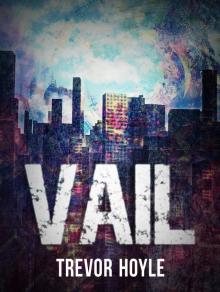 Vail
Vail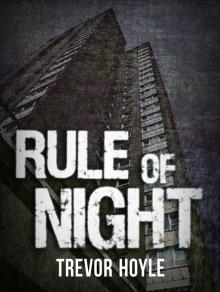 Rule of Night
Rule of Night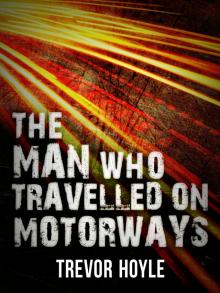 The Man Who Travelled on Motorways
The Man Who Travelled on Motorways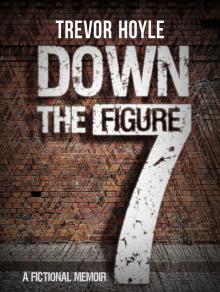 Down the Figure 7
Down the Figure 7 The Gods Look Down
The Gods Look Down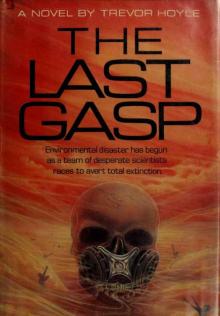 Last Gasp
Last Gasp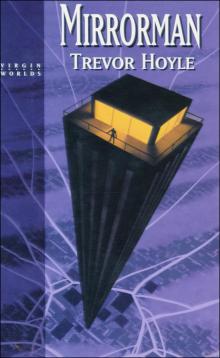 Mirrorman
Mirrorman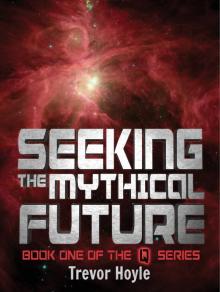 Seeking the Mythical Future
Seeking the Mythical Future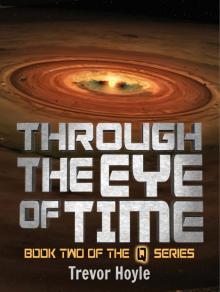 Through the Eye of Time
Through the Eye of Time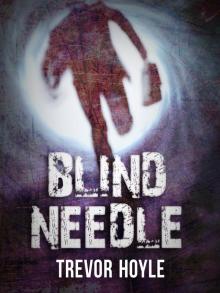 Blind Needle
Blind Needle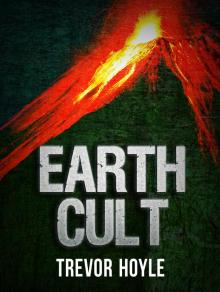 Earth Cult
Earth Cult